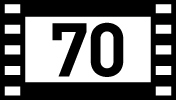

I've said before that cinema is my religion. I worship at the church of the three-act structure, and I believe in the redemptive power of the Hollywood character arc. But it's good to have your faith challenged from time to time, so you can be sure that you haven't turned into a brainwashed zealot. PT Anderson's The Master, a film that follows none of the basic tenets of my faith, is certainly not good enough to make me renounce my religion, but that doesn't mean there isn't a lot to admire about this picture.
First and foremost, the movie looks cool, capturing the late '40s and early '50s in an astonishing way. The costumes, make-up, cars, and décor are perfect, and the film gives the viewer a tangible feeling of authenticity. Comparing The Master to any other period film this year (like Hyde Park on Hudson, which I saw the same week) is like eating a bar of the finest Swiss dark chocolate and biting into a stale, generic milk chocolate from a fifteen-year-old advent calendar. Even AMC's much-acclaimed Mad Men, which gets all its props and costumes just right, still looks and feels like another TV show, but watching The Master is like seeing old photographs come to life. Mihai Mălaimare Jr., the digital cinematographer of Francis Ford Coppola's Tetro and Twixt, delivers some breathtaking images (and some sloppy ones too). But production designers Jack Fisk and David Crank and costume designer Mark Bridges create such a lived-in post-WWII world that watching The Master is like seeing old photographs come to life. As the first fifteen minutes washed over me, I was completely transported.
Joaquin Phoenix, in the lead role, also helps evoke the era, as his face and bearing seem so absolutely correct for the period and his emotionally damaged Navy veteran character. Since Phoenix's the most raw and undisciplined actor of his generation, he's also the perfect fit for this not entirely formed picture. The other two leads, Philip Seymour Hoffman and Amy Adams, are also excellent. The always brilliant Hoffman plays Lancaster Dodd, an L. Ron Hubbard-style cult leader who takes a shine to Phoenix's maladjusted World War II veteran. As Dodd's wife, Adams proves she's an even better actress than I give her credit for.
I have no idea what the film is about or what Andersen is trying to say with it, and I'm not sure he does either. It has something to do with leading and following, with identity, survival, and the cult of personality. But it also feels like a young director granted auteur status playing around with cameras, actors, and thematic ideas. When Phoenix accuses Philip Symore Hoffman's cult leader of "making it up as he goes along," I can't help but wonder if that's what Anderson and his cast are doing as well. It's far from a great film but worth seeing, especially in a theater.
Much was made of director P.T. Anderson's decision to shoot the film in 65mm, which hadn't been done since Kenneth Branagh's Hamlet in 1996, and before that since Ron Howard's Far and Away in 1992. But the use of that format here turned out to be an odd choice. It's a small and intimate film, not an epic, consisting mostly of people talking indoors, which doesn't really call for a grand presentation. I fear the admirable "see it in 70mm" campaign Anderson launched with this picture won't do much to help the cause of celluloid.
PT Anderson's Post-WW II meditation on identity, survival, and the cult of personality features excellent performances by Joaquin Phoenix, Philip Seymour Hoffman, and Amy Adams, as well as some cool 65mm photography, but it's a production in search of the movie.





